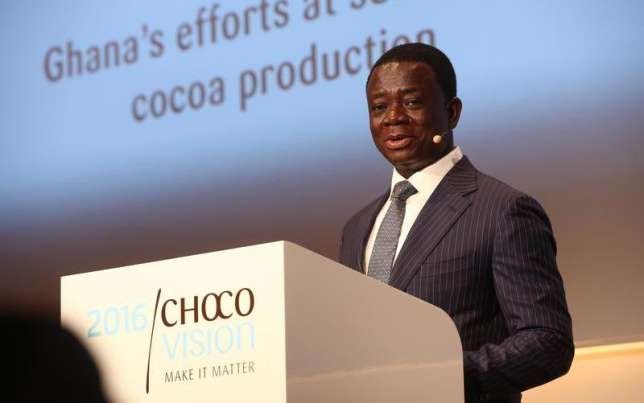Some key letters and documents that are crucial to the ongoing trial of former Ghana Cocoa Board (COCOBOD) CEO Dr Stephen Kwabena Opuni and businessman Seidu Agongo, which went missing at the Cocoa Research Institute of Ghana (CRIG) are yet to be found, that’s according to the Deputy Director in charge of legal affairs at COCOBOD, Johannes Velba.
The court, on 17 December 2018 ordered the management of CRIG to furnish it with the documents after Mr Benson Nutsukpui, the lawyer for Mr Agongo, told the hearing that CRIG had failed to fully comply with an earlier order to that effect.
At that hearing, Mr Nutsukpui called the attention of the court to the omission of some key attachments including an invoice to a letter of 20 November 2014. He also mentioned an evaluation report on Codapec/Hitec products submitted to COCOBOD per CRIG letter CRG27/118/4643 dated 31 August 2016, which was attached to the report of testing of agrochemicals.
He also cited a report on the analysis of two granular fertiliser samples in a rice sack submitted to the CEO on 24 October 2016 by a letter with the reference number CRG39/14Vol22/5577 plus an update on the effort to trace another letter dated 21 October 2014.
Mr Velba explained at the time that efforts to trace that letter have so far been fruitless, adding that available evidence point to either a misfiling or tampering of the records.
He also affirmed that some of the folders from which the files got missing, were either renumbered or suffered erasures. He then told the court that CRIG had set up a committee to investigate the circumstances surrounding the non-availability of that letter.
However, when sitting resumed on Monday, 21 January 2019, Mr Velba told the court that even though the committee set up by CRIG to look into the possible tampering is yet to conclude its work, no successes have been recorded in tracing the missing documents.
Mr Velba added that they have also not been able to unravel the circumstances that led to the disappearance of the documents. He, however, told the court that the committee will present a full report in about 14 days, within which period they would have been done with their probe.
Mr Agongo, who held the majority shares of the now-defunct Heritage Bank, which had its licence recently revoked by the Bank of Ghana over the COCOBOD case, is alleged, together with Dr Opuni, to have fraudulently secured several contracts totalling GHS271 million to supply fertiliser to COCOBOD.
In March 2018, the Attorney General charged the two of them with 27 counts of willfully causing financial loss to the state.
It is the contention of the AG that Dr Opuni, during his tenure as COCOBOD CEO (November 2013 to January 2017), breached laid-down procedures in procurement and other laws that led the state to lose GHS271.3 million in the alleged fertiliser scandal and the distribution of substandard fertiliser to cocoa farmers.
The two accused persons have denied any wrongdoing and have pleaded not guilty to all the 27 charges and have each been granted a GHS300,000.00 self-recognisance bail by the court.
Announcing the revocation of Heritage Bank’s licence on Friday, 4 January 2019, the Governor of the central bank, Dr Ernest Addison told journalists – when asked if he did not deem the action as premature, since the COCOBOD case was still in court – that: “The issue of Heritage Bank, I wanted to get into the law with you, I don’t know if I should, but we don’t need the court’s decision to take the decisions that we have taken. We have to be sure of the sources of capital to license a bank; if we have any doubt, if we feel that it’s suspicious, just on the basis of that we find that that is not acceptable as capital. We don’t need the court to decide for us whether anybody is ‘fit and proper’, just being involved in a case that involves a criminal procedure makes you not fit and proper”.
Source: Ghana/Starrfmonline.com




